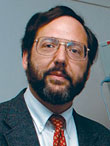
For Release: 5 pm ET, April 16, 2008
Contact: Deborah Kimbell 603-653-0877 / 802-236-6934 (cell)
Claims of Physician Workforce Crisis Ignore Real Problems in Health Care

Dr. David Goodman

Dr. Elliott Fisher
Hanover, N.H.—Increasing the size of the physician workforce has not led overall to better care, greater availability of care or patient satisfaction with medical care. So why do some continue to argue that adding more doctors is critical to addressing the US health care crisis? That's the question posed by Dartmouth Medical School physicians David C. Goodman and Elliott S. Fisher in the April 17 New England Journal of Medicine.
Goodman and Fisher, of the Dartmouth Institute for Health Policy and Clinical Practice, argue that simply adding physicians would be treating the symptoms of an ailing health care system, while ignoring the underlying disease: "a largely disorganized and fragmented delivery system, characterized by lack of coordination, incomplete patient information, poor communication, uneven quality and rising costs." Moreover, they write, increasing the size of the workforce is likely to worsen existing problems and potentially create more.
Currently, there are more physicians per capita in the United States than at any time in the last 50 years. Recent recommendations by the Council on Graduate Medical Education (COGME) and the Association of American Medical Colleges (AAMC) call for expanding the number of physicians in training by 30 percent over the next two decades.
The authors make the following points:
- The presence of more physicians doesn't translate into better care, but it will unquestionably mean greater spending.
- Based on past research, existing regional inequities in the distribution of physicians will not be addressed by simply increasing the number of physicians.
- Expansion of graduate medical education is likely to reinforce trends toward more lucrative, specialty-oriented medicine, further undermining the availability of primary care.
- Enlarging the workforce will be expensive. The authors estimate the cost of training physicians to meet the recommended 30 percent increase would be between $5 and $10 billion per year.
"If outcomes and patients' perception of access improved as supply increased, then we could debate whether an expansion of training offers better value than investments in preventive care, disease management or broader insurance coverage, which have known benefits. Instead, the costs of expansion will limit the resources available for necessary reform efforts, without any evidence-based promise of a benefit," the authors write. Goodman, professor of pediatrics and of community and family medicine, and Fisher, professor of medicine and of community and family medicine, are also, respectively, associate director and director of the Center for Health Policy Research at the Dartmouth Institute.
They point to the experience in Massachusetts as an example of the unproven benefits of adding to the number of physicians. Massachusetts has doubled its physician corps since 1976 and now has the highest physician to population ratio of any state, including primary care doctors. But patients there continue to report difficulty getting appointments and in receiving care in a timely way. People with lower incomes and without insurance report even greater problems with availability of care.
Rather than focus narrowly on the physician workforce, Goodman and Fisher suggest reallocating a portion of existing medical education funding to programs such as geriatric and palliative care fellowships that could lead to improved care coordination and chronic disease management. They also urge an acceleration of efforts to reform health care payment systems to reward integration, coordination and efficient care, rather than more care and more medical procedures and hospitalizations.
For copies of the commentary, "Physician Workforce Crisis? Wrong Diagnosis, Wrong Prescription," visit http://content.nejm.org/ or email deborah.kimbell@dartmouth.edu.
-DMS-